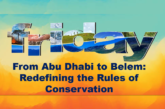Evolving Ecological Civilization
By Dr Arvind Kumar
Given the irresistible damage being done to the world’s environment and to its people, it is crucial to consider how we can evolve a truly ecological civilization—one that exists in harmony with natural systems—instead of trying to overwhelm and dominate nature. This is not just an ethical issue; it is essential for our survival as a species and the survival of many other species that we reverse the degradation of the earth’s life support systems that once provided dependable climate, clean air, clean water (fresh and ocean), bountiful oceans, and healthy and productive soils. There are several ways to approach and think about the massive damage that has been done to the environment. There is a need to pnder over the following: (1) the critical characteristics that underlie strong ecosystems; (2) why societies are not adequately implementing ecological approaches; and (3) how we might use characteristics of strong natural ecosystems as a framework to consider a future ecological civilization.
The degree of resiliency and self-renewal depends on how well all the traits are developed and incorporated into society. Community and regional social structures and economies that can better withstand adverse events and recover quickly will be more sustainable. The characteristics or pillars like—self-regulation, self-sufficiency, diversity, and efficiency through closely linked metabolic relationships—all contribute to creating a resilient society. Community and regional structures and economies based on these characteristics should be able to withstand adverse events and recover more quickly through a process of self-renewal. Global cultural interchange and cooperation also enhance resiliency.




